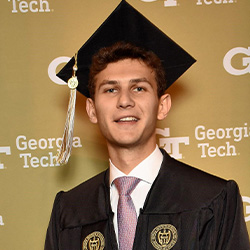As the financial industry undergoes rapid transformation through digital innovation, the Scheller College of Business is preparing students to lead the future of finance with its newly launched Fintech minor.
Developed in partnership with the College of Computing, the minor offers students a powerful blend of financial theory and technological expertise, equipping them for careers in algorithmic trading, blockchain, digital banking, and financial data analysis. Since its launch, the program has quickly gained traction, now boasting 228 enrolled students – a testament to the rising demand for tech-savvy finance professionals.
Among the first to graduate with the minor are Alexandre Abchee, BSIE ’25, and Logan Roach, BSBA ’24, whose experiences reflect the program’s interdisciplinary strength and real-world impact.
Major: Industrial Engineering
Minor: Fintech
What excites you most about fintech?
Fintech is driving a new era, and blockchain’s integration into traditional finance is the most exciting part. It’s reshaping everything from settlements to cross-border payments, making systems more transparent and accessible. It’s thrilling to be part of the generation leading this change.
What was your favorite Scheller course?
My favorite course was MGT 4074, "Fintech and Crypto Tokens," with Dr. Joseph Hall. Dr. Hall brings incredible energy to the class. My final project involved building a decentralized exchange, which pushed me to understand bonding curves and liquidity pools.
By the end, I had developed a strong grasp of how decentralized exchanges function, as well as how token-specific rules and smart contract inheritances shape the trading experience. It was the perfect blend of technical problem-solving and applied financial theory.
Have you had any internships or practical experiences related to fintech?
I interned at a wealth management firm in Geneva. During my internship, I applied my fintech knowledge to support investment meetings and analyze digital assets. I shared insights on regulations like the GENIUS Act and created materials on blockchain-based products. It was rewarding to see how technical expertise, paired with clear communication, can shape real-world financial decisions.
What resources (e.g., clubs, events, networking opportunities) at Georgia Tech have been most beneficial for your fintech journey?
Georgia Tech gave me the tools to succeed in fintech. GT Venture Capital (GTVC) offered hands-on experience with startups, while events with firms like Millennium and BlackRock helped me connect with industry leaders. Scheller’s professors showed me how to apply my engineering background to solve financial challenges, building both my technical foundation and professional network.
What advice do you have for students considering a career in fintech?
My advice is simple: don’t be afraid to innovate. Always ask questions, share your ideas, and find ways to bring them to life. In fintech, you can embrace opportunities to test, learn, and iterate. The industry moves quickly, and curiosity is one of your greatest assets. Embrace experimentation, learn through experience, and stay open to new technologies and perspectives. The willingness to take calculated risks and adapt will set you apart.
What’s next for you?
I will be starting my master’s in Operations Research at Georgia Tech in Fall 2025. After graduation, my goal is to work in a fintech company as an operations analyst – a role I believe bridges the gap between industrial engineering and financial technology by combining process optimization with innovative financial solutions.
Read the full story here.
